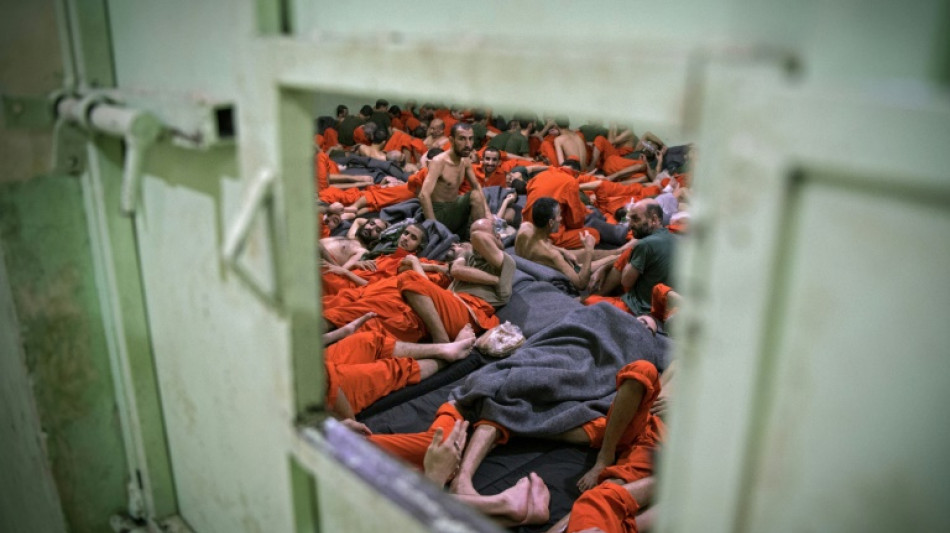

IS attacks Syria jail, military base in Iraq in deadly escalation
The Islamic State group on Friday attacked a Syria prison housing fellow jihadists and a military base in Iraq in near simultaneous deadly operations that revived fears of an IS resurgence.
The jihadist group has yet to comment on the attacks and there is no indication that they are coordinated but, according to analysts, they strongly suggest IS is trying to boost its ranks and arsenal in an attempt to reorganise across both countries.
In Syria, an ongoing IS attack on a northeastern detention facility holding the largest number of IS suspects killed at least 23 Kurdish security forces and set "dozens of IS fighters" free, according to the Britain-based Syrian Observatory for Human Rights.
The prison break that began late Thursday was one of the group's most significant attacks since its "caliphate" was declared defeated in the war-torn country nearly three years ago.
As IS operatives launched their bid to free some of the estimated 3,500 fellow fighters jailed at Ghwayran prison in the Syrian city of Hasakeh, the jihadists killed 11 soldiers in an attack on an army base in the east of neighbouring Iraq.
The attack marked the jihadists' deadliest operation in Iraq this year.
While the Iraq operation quickly came under wraps, Kurdish forces in Syria continued to battle jihadists in Hasakeh, hours after the prison attack began with an IS car bomb the previous night, the Observatory said.
The war monitor, providing figures that were not immediately confirmed by the authorities of the autonomous Kurdish region, said nearly 40 jihadists were killed in the ongoing fighting which also drew in US-led coalition forces.
The brazen IS operation sewed chaos in Hasakeh, forcing people to flee the area around Ghwayran prison, with at least five civilians reported killed, according to the Observatory.
IS fighters hunkered down in homes around the facility, sometimes using residents as human shields, as Kurdish forces backed by coalition aircraft fought to retake full control of the neighbourhood and hunt down prisoners on the loose.
"IS fighters killed four of our neighbours," said Umm Ibrahim, who was forced to escape her neighbourhood near the prison.
"We left because of the clashes. We feared for our children," the 38-year-old told AFP.
- Human shields -
IS has carried out regular attacks against Kurdish and government targets in Syria since the rump of its once-sprawling proto-state was overrun on the banks of the Euphrates in March 2019.
Most of their guerrilla attacks have been against military targets and oil installations in remote areas but the Hasakeh prison break could mark a new phase in the group's resurgence.
The Syrian Democratic Forces, the Kurds' de-facto army in northeastern Syria, said it had recaptured 89 IS detainees in its sweep of the area.
"Clashes continue in the vicinity of the prison," the SDF said in a statement.
The US-led coalition formed to battle IS acknowledged the attack and added that the SDF had suffered casualties but did not say how many.
IS "remains an existential threat in Syria and cannot be allowed to regenerate," the coalition said.
The Kurdish authorities have long warned they do not have the capacity to hold, let alone put on trial, the thousands of IS fighters captured in years of operations.
According to Kurdish authorities, more than 50 nationalities are represented in a number of Kurdish-run prisons where more than 12,000 IS suspects are now held.
From France to Tunisia, many of the IS prisoners' countries of origins have been reluctant to repatriate them, fearing a public backlash at home.
- Jihadist strategy -
Prison breaks have been a recurring part of jihadist strategy in both Iraq and Syria for more than a decade.
Before becoming the world's most wanted man, Abu Bakr al-Baghdadi, the leader of what was later to become known as the "Islamic State", had launched a campaign in 2012 focused on releasing prisoners.
His proclamation of the Islamic State's so-called caliphate in 2014 across swathes of Iraq and Syria came after a wave of operations in Iraq during which several hundred fighters were freed, including from the notorious Abu Ghraib prison.
"Jailbreaks and prison riots were a central component of IS resurgence in Iraq and is a serious threat in Syria today," said Dareen Khalifa, senior Syria analyst at International Crisis Group.
She noted that many of the prisons in the Kurdish-run areas of Syria where much of the IS caliphate's former "army" is being held are converted schools ill-suited to holding high-risk detainees for long periods.
Since Kurdish forces backed by the US-led coalition flushed out the last die-hard jihadists holding out in the village of Baghuz in 2019, IS has been patiently rebuilding.
The confusion and corruption that are rife in the vast desert expanses on both sides of the Iraqi-Syrian border have allowed IS remnants to lie low and plot their next moves.
Ch.Schaack--LiLuX



